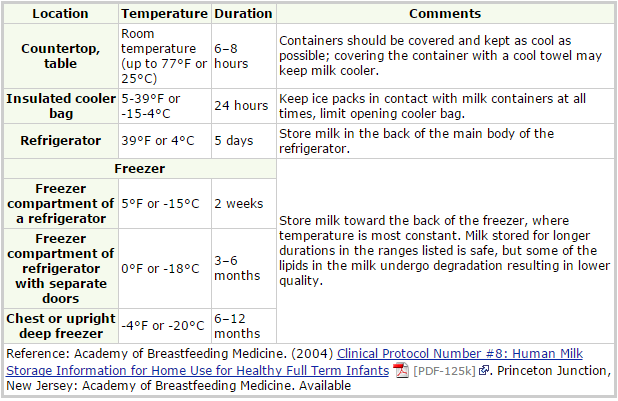The Short Answer
Breast milk can be safely consumed if it has been at room temperature for no more than 6 to 8 hours total, which includes all of the time the milk spends above refrigerated temperature. So, if you heat it up to room temperature, then put it back in the fridge after half a period of time, you to account for:
- The time it takes to heat up the milk
- The time the milk spends outside of the fridge
- The time it takes for the milk to cool back down, once back inside the fridge. Depending on the initial temp, the bottle size, and the fridge temp, this could take another 30+ minutes.
The longer the breast milk stays above refrigerated temperatures, the less time it will be viable in the fridge. Guidelines say that milk in the fridge can last 5-8 days, but that time will be considerably less if the milk isn't properly placed in the refrigerator immediately after pumping. Conversely, the longer the milk stays in the fridge, the less time it will be viable at room temperature. Continue reading for more explanation and details.
The Long Answer
In food service, temperatures that are ideal for breeding micro-organisms are called the Danger Zone or something similar. Different foods have different amounts of time they can spend in the danger zone based on the types of bacteria/organisms that grow on/in them.
Once a food has been taken into the danger zone, you also shorten its refrigerated expiration date. While fresh breast milk that's immediately put in the fridge may last 5-8 days, a bottle that's spent 2 hours at room temp may only last 3-4 days instead.
I don't think you'll find any hard data about how many more days a bottle will last in the fridge based on how long it spent at room temperature. That would have to be some very controlled experiments that, in the end, wouldn't serve much usefulness.
To answer your question, we must make some inferences with the data we do have.
For instance, we also know that if you freeze the expressed milk at all, then after you thaw it out it must be consumed within 24 hours or thrown out.
So, we know:
- Keeping milk at higher temperatures decreases how long it will last at lower temperatures
- Keeping milk at lower temperatures does not necessarily preserve the initial maximum safe time at higher temperatures
Putting that together, and some general assumptions:
The longer the milk has been in the fridge, the sooner it will go bad. If it's only been refrigerator for a day, then it should still be okay for about 6 hours. If it's been in there for 5 days, I'd only give it 2 hours.
Your wife shouldn't have to worry about using day-old milk within two hours. I'd be surprised if you didn't get at least four hours. However, if the room/milk temperature is greater than 77 F/25 C, then it will last significantly less than the noted 6 hours.
Other factors to keep in mind that will affect how long milk last:
- The cleanliness of the nipple area before/during pumping
- How well sanitized the storage containers are if they're reusable
- How well sanitized and maintained the pieces of the pump that contact the milk are
- Whether or not you store it in the back of the fridge (because the front meets warmer air every time the fridge door is open)
- How much you warm up the milk, if "serving" it above room temperature
Personal Experience
We never had problems with refrigerated milk spoiling within 1-2 hours. When my son was under 1 year old we'd often leave a bottle in his crib with him at night. The ones he didn't finish would still be okay 4-6 hours later. We usually didn't give it to him again, but if he woke up and decided to finish the bottle before we had a chance to take it there were never any problems. Rarely, if ever, did the milk stay in the fridge for longer than 2 days.
However, we did have times when milk stored in an insulated cooler bag with ice packs would spoil much faster than we expected, which made some of our longer car trips surprisingly more difficult.
